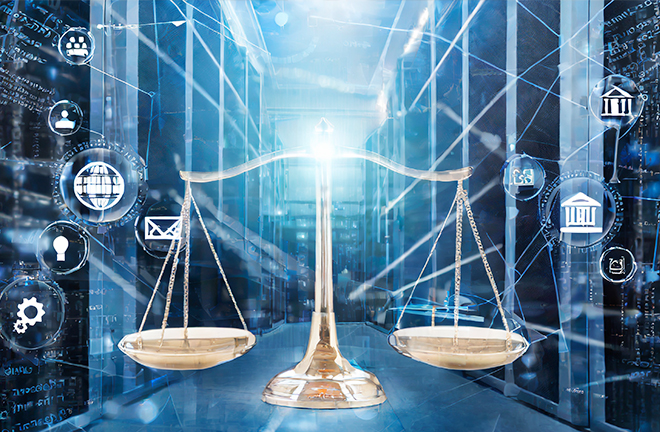Trends in digital jurisprudence

Digital jurisprudence Photo: TUCHONG
In recent years, rapid advancements in digital technologies such as big data, artificial intelligence, blockchain, and the Internet of Things have brought about significant changes in social life. The enactment of the Personal Information Protection Law, the Data Security Law, and the Cybersecurity Law by the Chinese government has given rise to the emergence of digital jurisprudence in China.
A new field
The widespread application of digital technology has revolutionized human society and brought about numerous issues that require new legal systems to promptly address.
For example, in the realm of personal information protection, traditional privacy law struggles to provide effective remedies for widespread micro-infringements. Regarding business data protection and sharing, the non-consumable, non-competitive, and non-exclusive nature of data necessitates data rights confirmation for data protection, while data sharing and aggregation are needed to endow data with public value. Regarding platform responsibility, internet companies manifest characteristics of both traditional businesses and “market makers” that shape a market economy.
Digital jurisprudence targets the dimensional and structural changes in social governance issues that already exist, rather than the digital aspect of issues within a specific field. As such, it should integrate various theories into systematic new theoretical modules and form domain-specific methodologies contributing to digital rule of law.
Interdisciplinarity
To achieve digital rule of law, it is important to advance the theoretical application of digital jurisprudence through interdisciplinary research.
On one hand, as social governance issues in the digital age have complex causes, it is necessary to analyze emerging issues in depth by means of theoretical tools from social sciences such as sociology, economics, and political science. For example, theories of political economy can help explain why tradition legal systems are ineffective in tackling information capitalism and digital manipulation. The reason for the difficulty in providing remedies for large-scale micro-infringements can be explored from the perspective of behavioral economics.
On the other hand, digital technology has considerably transformed social reality, causing tensions and conflicts with existing legal systems. Data, as a non-competitive, non-exclusive factor of production, is not compatible with existing property rights systems based on the competitive and exclusive nature of property. There is a mismatch between algorithms, which have enlarged the scope and degree of the impact of individual decision-making, and tort remedies based on static individual centeredness and material injury.
Existing legal systems mostly rely on linear governance between public power and businesses or between public power and individuals. Digital technology has reshaped the social identity and status of businesses and individuals, with widespread power imbalances among various entities, requiring legal systems to fulfill a broader range of functions.
The design and reconstruction of legal systems requires drawing upon the knowledge and wisdom of social sciences, rather than relying entirely on customary laws of the pre-digital age. Tools such as cost-benefit analyses or behavioral experiments can be used to compare the consequences and benefits of different approaches.
To achieve digital legal governance, it is also necessary to advance the practical application of digital jurisprudence through interdisciplinary research.
On one hand, digital rule of law involves both upholding traditional rule of law and controlling digital “private power.” Firstly, digital jurisprudence should question the value assumptions behind digital technology and use the technology to build multi-dimensional accountability systems. Secondly, digital jurisprudence should adopt approaches such agile governance, privacy by design, and interoperability to address the increase in the scale and pace of governance issues in the digital age. Thirdly, digital jurisprudence must dynamically integrate with computer science, information science, and related disciplines in order to comprehensively address issues such as black box algorithms and privacy computing.
On the other hand, digital legal governance needs to leverage digital technology to enhance governance effectiveness. Comprehensive and multi-dimensional compliance guidelines, monitoring, and analysis can be enabled by integrating digital technologies into digital governance. Digital technology can also enhance the transparency, scientific nature, and legitimacy of governance. However, the response of digital rule of law to the issue of technological due process still requires further exploration.
Dynamic governance
The dynamic nature of digital jurisprudence is determined by the rapid development of the digital society. Digital jurisprudence should strive for future-oriented governance to deal with the “Collingridge dilemma.” From the industrial age to the digital age, law has consistently grappled with challenges such as the incompleteness of welfare analysis, the limited rationality of the public, the unavailability of future information, and the lagging nature of the original intentions of law. However, such challenges have become more salient with the emergence of digital technology.
Digital jurisprudence should particularly emphasize dynamic governance to ensure that legal regulations on digital issues are neither lagging behind nor proceeding prematurely. A learning governance mechanism needs to be established to urge regulatory agencies to keep learning and avoid governance rigidity. A governance model of government-business-society cooperation should be constructed to promote the organic integration of government regulation, self-regulation by business, and reputation regulation by society.
Once digital jurisprudence has developed dynamic governance concepts and mechanisms and can adhere to its functional role of future-proofing law, digital rule of law can adapt to the disruptive innovation brought about by digital technology and achieve good governance in the digital domain.
Ding Xiaodong is a professor at the Law School of Renmin University of China.
Edited by WANG YOURAN
